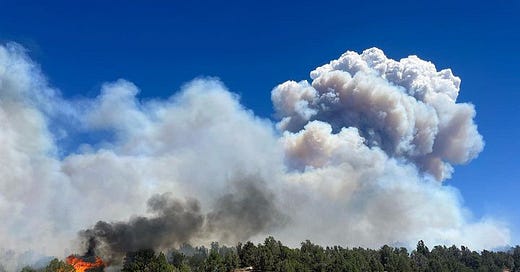Joint Letter Sent To Senators Urging Them To Pass Permanent Wildfire Pay Reforms.
NFFE Leadership asks for the public’s help.
This week, a joint letter was sent to senators requesting their support for new legislative language to permanently implement the pay reform for wildland firefighters. The major difference in this request compared to others is that even if this were put in the upcoming continuing resolution, the adjusted language of the legislation would make the pay reforms permanent, even if the CR was not.
Randy Erwin, President of the National Federation of Federal Employees, sent the letter, which was also signed by Lucas Mayfield, President of Grassroots Wildland Firefighters.
In speaking with NFFE leadership, they are hopeful this can be voted on in the Continuing Resolution or some other disaster relief bill before the end of the year. The change in the language is due to the incoming Congress and concerns about any budgetary measures moving forward. Even if the supplemental pay is continued until next spring, there are no guarantees for any budget-related initiatives moving forward after that once the new Congress is sworn in.
So, the push is to make it permanent now.
The three main requests are as follows:
1. Permanently lncrease Federal WF F Pay. The bill would avoid the impending pay cliff by permanently increasing WFF pay at levels at or near those enacted within the current temporary increase extended from legislation passed in 2021 (llJA).
2. Establish a new Pay Scale for WFFs. The bill's pay increases are largely realized by establishing a new pay scale for WFFs at all grade levels, similar to the General Schedule (GS) pay scale that applies to most federal employees.
3. Establish Additional Pay Supplements for WFFs. Base pay is supplemented by additional pay for each day a firefighter is deployed on a wildland fire.
Meetings with representatives are ongoing, and more information on its progress will be available next week. Leadership representatives from NFFE have accepted an invite to catch everyone up on their progress on the podcast before the Thanksgiving Holiday.
Everyone I have spoken to is hopeful but urges the public and wildland firefighters alike to help by signing the petition to push this across the finish line. The focus has long been on the House of Representatives, but this will be directly focused on the Senate.
That petition can be found HERE:
Hopefully, this will pass when the vote occurs in mid-December, and there won’t be month-by-month concern about a 50% decrease in wildland firefighters’ wages next year.
Here is the full letter:
Dear Senator,
An urgent request - include the bipartisan, bicameral Federal Wildland Firefighter pay adjustment in the next CR or Emergency Supplemental to stop a pay cliff that will cripple emergency incident response.
Background
15,000 Federal Wildland Firefighters (WFFs) from the U.S. Forest Service (USDA) and the Department of the Interior (DOI) endure longer and more dangerous wildfire seasons each year, with the loss of life and property increasing at a phenomenal rate. A temporary WFF pay adjustment has expired, putting our federal WFFs at risk. We have pending legislation that is a permanent fix to the WFF pay problem. Failing to act will mean that federal firefighters will endure a pay cut of up to 50% of base pay, up to $20,000.
A bipartisan, bicameral fix is already supported by authorizers and appropriators. This fix MUST be included in the next CR o r
EmergencySupplemental. Save lives, save property, and sustain a wildland firefighting workforce. House and Senate FY 2025 interior appropriations bills include a permanent pay fix supported by Democratic and Republican Committee and Subcommittee Chairs and Ranking Members. This legislation would:
1 . Permanently lncrease Federal WF F Pay. The bill would avoid the impending pay cliff by permanently increasing WFF pay
at levels at or near those enacted within the current temporary increase extended from legislation passed in 2021 (llJA).
2. Establish a new Pay Scale for WFFs. The bill's pay increases are largely realized by establishing a new pay scale for WFFs at all grade levels, similar to the General Schedule (GS) pay scale that applies to most federal employees.
3. Establish Additional Pay Supplements for WFFs. Base pay is supplemented by additional pay for each day a firefighter is deployed on a wildland fire.
Bipartisan, Bicameral Support from Authorizers and Appropriators:
Senate ENR Chair Joe Manchin and Ranking Member John Barrasso. Senate Appropriations Chair Patty Murray and Vice Chair Susan Collins. Senate lnterior Appropriations Chair Jeff Merkley and Ranking Member Lisa Murkowski. House Appropriations Chair Kay Granger and Ranking Member Rosa Delauro. House lnterior Appropriations Chair Mike Simpson and Ranking Member Chellie Pingree
Built-ln Offsets
Majority and Minority Appropriators realize that automatic offsets will occur from:
1. Smaller and fewer wildfires.
2. Saving on remediation costs.
3. More prescribed burns that prevent fires.
4. More effective use of current resources (e.g., fire engines and hotshot crews sitting idle due to high position vacancies).
5. Less FEMA and other financial assistance to wildfire victims and towns.
Sincerely, Randy Ervin and Lucas Mayfield
THE HOTSHOT WAKE UP — Thank you to all of our paid subscribers. Your support allows us to donate generously to firefighter charities and supports all of our content. You also receive all of our article archives, more podcast episodes, Monday morning workouts, and also entered into our giveaways, plus more.




